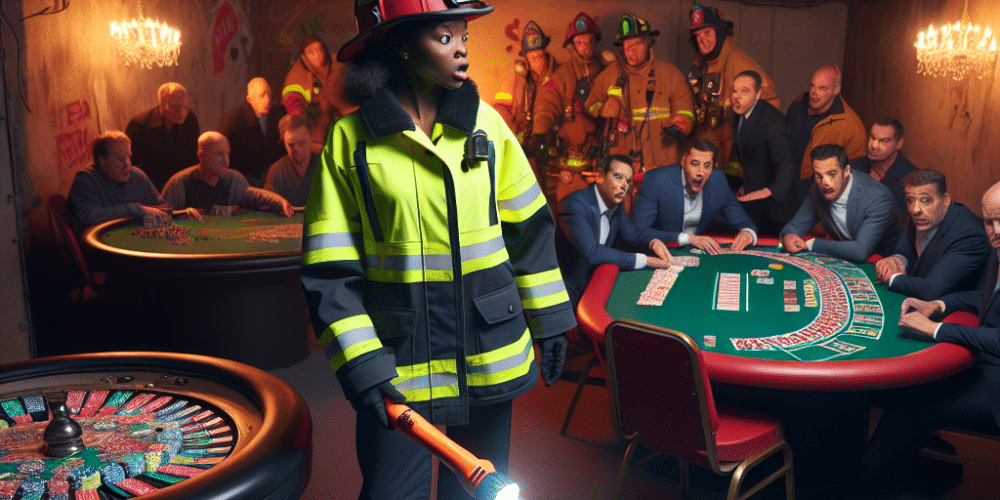An investigation by the New York City’s Fire Department’s Bureau of Fire Prevention (BFP) on September 19, 2025, led to the uncovering of an alleged illegal gambling operation in Manhattan. FDNY officials were originally responding to a complaint regarding potentially illegal lithium-ion battery charging in a building on Elizabeth Street when they stumbled upon a broader range of unlawful activities.
During their inspection, fire officials identified various “dangerous and unlawful conditions.” These included the presence of gambling machines, counterfeit goods, and unsafe living setups. The inspectors discovered that the front and rear cellars of two buildings had been illicitly transformed into sleeping quarters, a practice often associated with safety hazards. The illegal conversion was apparent as they gained entry into the premises.
Upon further examination, the inspectors found an alleged gambling operation that featured slot machines. Additionally, there was a storage area filled with counterfeit designer bags and accessories. Numerous lithium-ion batteries were found charging throughout these basements, raising serious safety concerns. These batteries have been linked to several deadly fires across New York City in recent years, serving as one of the first signs of the broader pattern of illegal activities being conducted there.
In a press release, FDNY Commissioner Robert S. Tucker highlighted the life-threatening conditions discovered during the inspection. The situation was serious enough that the FDNY sought assistance from the Department of Buildings (DOB) and the New York City Police Department (NYPD). The DOB responded by issuing partial vacate orders for the cellar areas in the implicated buildings. Meanwhile, the NYPD Vice Unit acted swiftly, confiscating gambling machines and counterfeit merchandise from the site. The Bureau of Fire Prevention issued two FDNY summonses and two criminal summonses to the addresses at 118 and 120 Elizabeth Street.
Further details emerged about the conditions within the buildings. The cellar hallways had been converted into single-room occupancies, crowded with mattresses, clutter, hot plates, and space heaters. The makeshift rooms lacked secondary exits, a critical safety flaw that the FDNY described as “mazelike.” Such configurations posed a severe threat to life safety due to the lack of emergency egress options and the excessive clutter that could impede evacuation or emergency access.
The FDNY underscored that the conditions found by Fire Prevention personnel were indicative of a disaster waiting to occur. Illegal living situations coupled with improper lithium-ion battery charging are a recipe for deadly hazards, threatening both residents and emergency responders. Commissioner Tucker noted the importance of such investigations, emphasizing that this particular inspection might have averted a potential tragedy.
However, the situation also raises questions about the underlying issues driving such illegal operations. With the skyrocketing cost of living in New York City, coupled with the scarcity of affordable housing, some residents are forced to resort to unconventional and illegal living arrangements. This context provides a backdrop to the illegal conversions noted by the FDNY.
On the other hand, the operation of illegal gambling dens highlights another facet of underground economies existing in metropolitan areas. The allure of untaxed income and the lack of stringent oversight in certain neighborhoods can tempt operators to run such illicit businesses.
A contrasting view suggests that while enforcement is necessary to prevent disasters, there must also be a focus on addressing the root causes of these illegal activities. Enhancing affordable housing initiatives and providing economic opportunities in underserved areas could reduce the incentive for individuals and groups to engage in illegal operations to make ends meet.
Nevertheless, the FDNY’s discovery is a reminder of the complex socio-economic dynamics at play in urban environments like New York City. As Commissioner Tucker pointed out, each investigation plays a crucial role in maintaining public safety and preventing potential tragedies. The collaboration between the FDNY, DOB, and NYPD in this scenario is a testament to the importance of joint efforts in tackling multifaceted urban challenges. While enforcement measures are effective in curbing immediate threats, a broader approach that also addresses systemic issues is crucial for lasting improvements.
In the ever-evolving landscape of New York City, challenges like these highlight the need for vigilant enforcement paired with proactive social policies. The city remains a vibrant but complex tapestry where safety, legality, and economic pressures intersect in ways that require nuanced and coordinated responses from authorities.

David Garato is a luminary in gaming journalism, renowned for peeling back the curtain on the gaming world with his witty and insightful commentary. A decade into weaving stories from the pixelated edges of indie games to the expansive universes of AAA titles, David’s work is a thrilling blend of analysis and adventure. When not writing, he’s live-streaming, sharing his gaming exploits with an engaged and growing audience. David doesn’t just write about games; he lives them, making him a trusted guide in the gaming community.
















